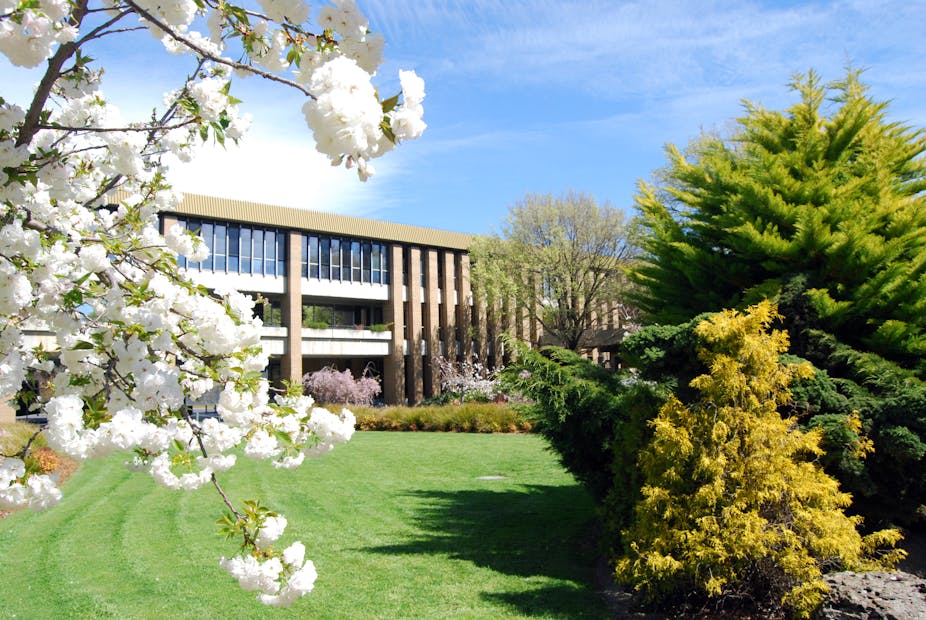The cuts to the humanities and social sciences faculty at La Trobe University have been the source of much debate among the academic community, and anger among affected staff and students.
This culminated in a stand-off between protestors and Vice-Chancellor John Dewar at the university’s open day last month.
But the ensuing fracas has also resulted in various claims and counter-claims being circulated in the press. A case in point is Vice-Chancellor Professor John Dewar’s recent contribution to The Conversation, in which he made some questionable claims about the state of humanities at La Trobe.
Questionable student ratios
Professor Dewar suggests that La Trobe needs to streamline its subjects in the Humanities and Social Sciences because it offers “one for every seven students”.
The Vice-Chancellor refers to 916 subjects against a 2010 enrolment of 7,163 full-time equivalent students, which is one subject for every 7.8 students. However, this 916 figure is wrong. It double-counts subjects offered simultaneously to second and third year students. It also includes “reading subjects” that do not involve lectures or tutorials and which rarely receive enrolments at all.
It over-counts language subjects by triple and quadruple in most instances. Adjusting this to reflect subjects that are actually taught in 2012 – approximately 500, rather than 916 – we get a figure of one subject for 14.3 full-time equivalent students (which is an average of 114 students per class, since students take 8 subjects per year). This is a far more reasonable subject-student ratio.
Professor Dewar also suggests that the subject offerings at the Faculty of Humanities and Social Sciences are three times more numerous than those of our local competitors.
But given the above correction, it is not clear that there is any significant difference between our offerings and those of our competitors, especially when it is taken into account that La Trobe needs to offer subjects to five separate regional campuses.
Student enrolments are increasing
According to Professor Dewar, the redundancies will be drawn from areas where student enrolments have been “at a record-low for a number of years”.
However, enrolment figures in the official May 2012 budget contest this claim. The Faculty of Humanities and Social Sciences reached its 2012 yearly enrolment target by the first semester census date, exceeding its goal at the Melbourne campus (Bundoora) by 11%.
While it is true that 2011 enrolments were down on expectations, this was an exception, not a norm. In 2012, enrolments were up across the faculty at the start of the year, in English, Sociology, Politics, and many other areas. This is why the Faculty’s academic staff are finding the deep level of cuts difficult to accept.
History will lose 43% of its academic staff, Sociology will shed 37% and many other areas will lose around 30%. Not only were enrolments up at the start of 2012, student survey results captured on the MyUniversity website provides an overall satisfaction rate of 86.7% for humanities including history and geography, an 88.8% rate for language and literature, and a 92.7% overall satisfaction rate for political science. These ratings are significantly higher than those at the University of Melbourne.
A blow to morale
These important errors in Professor Dewar’s contribution to The Conversation cannot but undermine the confidence that employees should have in their management. Staff morale is at an all-time low, a blow to the ethic of civility and collegiality that is central to the functioning of a university.
The Vice-Chancellor would do well to heed the sentiment expressed by well-known Professors Robert Manne and Peter Beilharz in their edited book Reflected Light: La Trobe Essays.
Manne and Beilharz write:
Like all institutions, universities are subject to constant change – driven by internal rhythms, external financial pressures, student demand, movements in intellectual fashion, shifts in the national and the international mood. Their challenge is to respond sanely to these forces without betraying the values that lie at their heart.
No doubt this is a difficult challenge, but their book showcases exactly what La Trobe stands to lose if cuts of this magnitude come into effect. Not only does this volume of La Trobe essays include many of Australia’s best-known public intellectuals, it also reminds us that in 2005 the quality of research in this faculty saw it ranked in the top 25 humanities faculties in the world by the Times Higher Education Supplement.
In 2012, the faculty retains quality teachers and researchers, performing well on Excellence in Research Australia measures, and offering courses that are popular with students.
Perhaps most importantly, Professors Manne and Beilharz remind us of the vital role of the liberal arts for the tradition of the Western university.
Ironically, if these cuts proceed, the effects of reputational costs and impacts on workload may well undermine the university’s ability to continue to use the humanities and social sciences as a source of revenue, compromising the future of the university as a whole.

